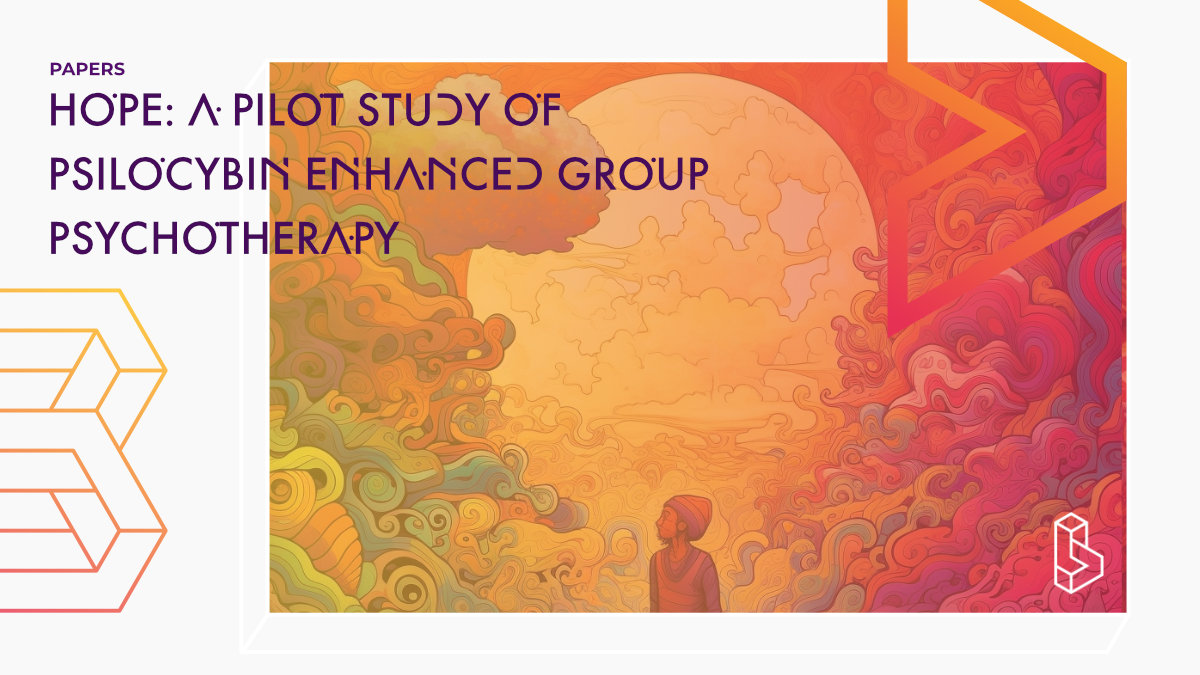This open-label study (n=12) investigates the potential of psilocybin-assisted group therapy (PAT) in cancer patients suffering from depression. Participants underwent preparatory sessions, a high-dose (25mg) psilocybin group session, and integration sessions over three weeks, with clinical outcomes measured at baseline, two weeks, and 26 weeks post-intervention. Results show significant decreases in depression symptoms and no serious adverse events, suggesting safety, feasibility, and possible efficacy of the therapy.
Abstract of HOPE: A Pilot Study of Psilocybin Enhanced Group Psychotherapy in Patients with Cancer
“Background Psilocybin-assisted psychotherapy shows promise in treating depression and existential distress in people with serious medical illness. However, its individual-based methodology poses challenges for scaling and resource availability. The HOPE trial (A Pilot Study of Psilocybin Enhanced Group Psychotherapy in Patients with Cancer) is an IRB-approved open-label feasibility and safety pilot study examining psilocybin-assisted group therapy in cancer patients with a DSM-5 depressive disorder (including major depressive disorder as well as adjustment disorder with depressed mood). We report here the safety and clinical outcome measures including 6-month follow up data.
Methods Outcome measures were collected at baseline, 2-week and 26-weeks post intervention. The study involved three group preparatory sessions, one high-dose (25mg) group psilocybin session, and three group integration sessions with cohorts of four participants over a three week intervention.
Results 12 participants completed the trial. No serious adverse events attributed to psilocybin occurred. The primary clinical outcome measures of change in symptoms of depression on the clinician administered 17-item-HAM-D showed clinically substantial decrease in HAM-D scores from baseline to the 2-week timepoint (21.5 to 10.09, p<0.001) and the 26-week timepoint (21.5 to 14.83, p=0.006). Six out of twelve participants met criteria for remission at 2 weeks, as defined by HAM-D < 7, three out twelve demonstrated a clinically significant change (4-6 points), and eight out of twelve demonstrated a clinically substantial change (7-12 points).
Conclusion This pilot study demonstrated the safety, feasibility, and possible efficacy of psilocybin-assisted group therapy for cancer patients dealing with depressive symptoms. Based on demonstrated efficacy and significant reductions in therapist time, future investigations with the group therapy model are warranted.”
Authors: Benjamin R. Lewis, Eric L. Garland, Kevin Byrne, Tyler Durns, John Hendrick, Anna Beck & Paul Thielking
Summary of …
For centuries, group format classic psychedelic administration within a ritualized, culture-bound framework has been used for religious/spiritual purposes. This includes traditional Mazatec communal rituals with psilocybin-containing mushrooms and group format ayahuasca ceremonial traditions in Central and South America.
The current model of psychedelic-assisted therapy involves individual preparatory sessions, 1 – 3 individual psilocybin sessions, and subsequent individual integration sessions with two therapists present for the duration of these encounters.
Recently, two trials have been published employing variations of the group format. These studies suggest possible benefits gained by group formats, however, neither employed a group-format psilocybin session.
Find this paper
HOPE: A Pilot Study of Psilocybin Enhanced Group Psychotherapy in Patients with Cancer
https://doi.org/10.1016/j.jpainsymman.2023.06.006
Paywall | Google Scholar | Backup | 🕊
Cite this paper (APA)
Lewis, B. R., Garland, E. L., Byrne, K., Durns, T., Hendrick, J., Beck, A., & Thielking, P. (2023). HOPE: A Pilot Study of Psilocybin Enhanced Group Psychotherapy in Patients with Cancer. Journal of Pain and Symptom Management.
Study details
Compounds studied
Psilocybin
Topics studied
Palliative Care
Depression
Study characteristics
Original
Open-Label
Participants
12
Humans
Institutes
Institutes associated with this publication
University of UtahResearch with psychedelics is underway at the University of Utah. At the university, researchers are working with the Usona Institute exploring psilocybin-assisted group therapy in patients with cancer.
Compound Details
The psychedelics given at which dose and how many times
Psilocybin 25 mg | 1xLinked Research Papers
Notable research papers that build on or are influenced by this paper
Group format psychedelic-assisted therapy interventions: Observations and impressions from the HOPE trialThis qualitative survey (n=10) from patients who underwent psychedelic-assisted therapy (PAT) with psilocybin (25mg) for depression associated with a cancer diagnosis (HOPE trial) provides information on group format PAT, which participants rated highly.
Linked Clinical Trial
Study of Psilocybin Enhanced Group Psychotherapy in Patients With CancerThis open-label interventional trial (n=12) explored the feasibility of offering psilocybin therapy in a group setting to patients with cancer. The study aimed to decrease the therapist-to-subject ratio, implementing a 1:1 ratio with a group size of six patients.

